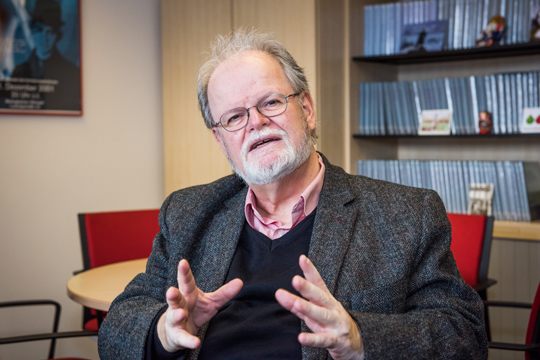Books people talk about
Freiburg, Apr 12, 2018
Books can build worlds in the mind's eye. They can provoke thought and make people laugh. What is more, they spark splendid debates. The new Studium Generale format "Books people talk about" is meant to encourage just that – debate. Starting on 18 April 2018 it will introduce new scholarly and essayistic books on the most varied of topics. It will also set up a forum for discussing these subjects in the presence of the works' authors. Sonja Seidel speaks with Studium Generale Director Werner Frick, who came up with the idea.

Photo: nd3000/Fotolia
Herr Frick, people generally read on their own in a quiet place at home. Why is it worthwhile to discuss books?
Werner Frick: Reading is similar to lectures – and there are more than enough of them at the university. One is like the other in that we're dealing with the asymmetric situation of a monologue. One person speaks or has written and everyone else passively registers the person's thoughts. We want to bring the readers out of the position of pure consumers. Naturally, it won't work without the quiet process of reading. But that's not enough. People have opinions and questions about the writing, and might like to express their doubts about it.
And the new series of events offers a platform for that?
That's right. "Books that people talk about" aims to introduce an example of debating in a friendly manner about non-fiction books. Scholarship involves argumentation, an exchange of opinions, and rational analysis. It has social and democratic components. We want to intensify the discursive factor in the Studium Generale. To do that we've invited readers who are specialists to take part in the debating sessions. We let the audience have their say, too. I think the format will be entertaining and may even be a bit like being in a sports arena. It will be exciting for the authors to discover what positions in their works have found agreement and what people reject.

Werner Frick aims to enrich the Stadium Generale's culture of debate with the new format "Books people talk about". Photo: Klaus Polkowski
How have you selected the books?
I used really broad criteria. One would be currency. The publication dates of the books should go back no further than two years at most. Next would be that the topic has to be relevant for a relatively large audience. Then, the media attention the book received and the authority of the author. All those factors influenced our decision. More by chance than anything else, the series starts with two authors from the area of Literary Studies. The Romance philologist Andreas Kablitz of Cologne, who will speak about his book on Thomas Mann's "The Magic Mountain." And the German Studies specialist from Stuttgart, Sandra Richter, who published the very innovative book "Eine Weltgeschichte der deutschsprachigen Literatur" (A World History of German-language Literature). Yet we're aiming to cover a broad, interdisciplinary range. That's why, in the run up to the Soccer World Cup we're going to discuss Jürgen Kaube's, "Lob des Fußballs" (In Praise of Soccer), with, among others, Volker Finke, the long-time coach of the soccer team, SC Freiburg.
Which book from your private library would you most like to discuss?
Right now I've got Wolfram Eilenberger's "Zeit der Zauberer. Das große Jahrzehnt der Philosophie, 1919-1929" (The Time of Magicians. Philosophy's Great Decade, 1919-1929" on my desk. It's a stimulating, well-written book, but it caused a great deal of controversy because it fires off broadsides at present-day philosophy, particularly academic philosophy, too. I'd also like to enlist Horst Dreier, a constitutional expert from Würzburg, for "Books that people talk about." He recently published the book "Staat ohne Gott. Religion in der säkularen Moderne" (Godless Nation – Religion in modern secularism). The topics it addresses and questions it touches upon are really exciting and they're currently being bandied about in public quite a bit Germany. In that discussion session, we'd need colleagues from Theology, Law and maybe Political Science as speakers. I could in any case express myself as a layman. Still, what we want most of all to achieve with "Books people talk about" is to encourage the general public to join in thinking and debating about books.
Join in the Debate
A session of "Books people talk about" will take place on 18 April 2018 in the Auditorium of the University Library, Platz der Alten Synagoge 2, 79098 Freiburg. Entry is free of charge.
More information (in German)

